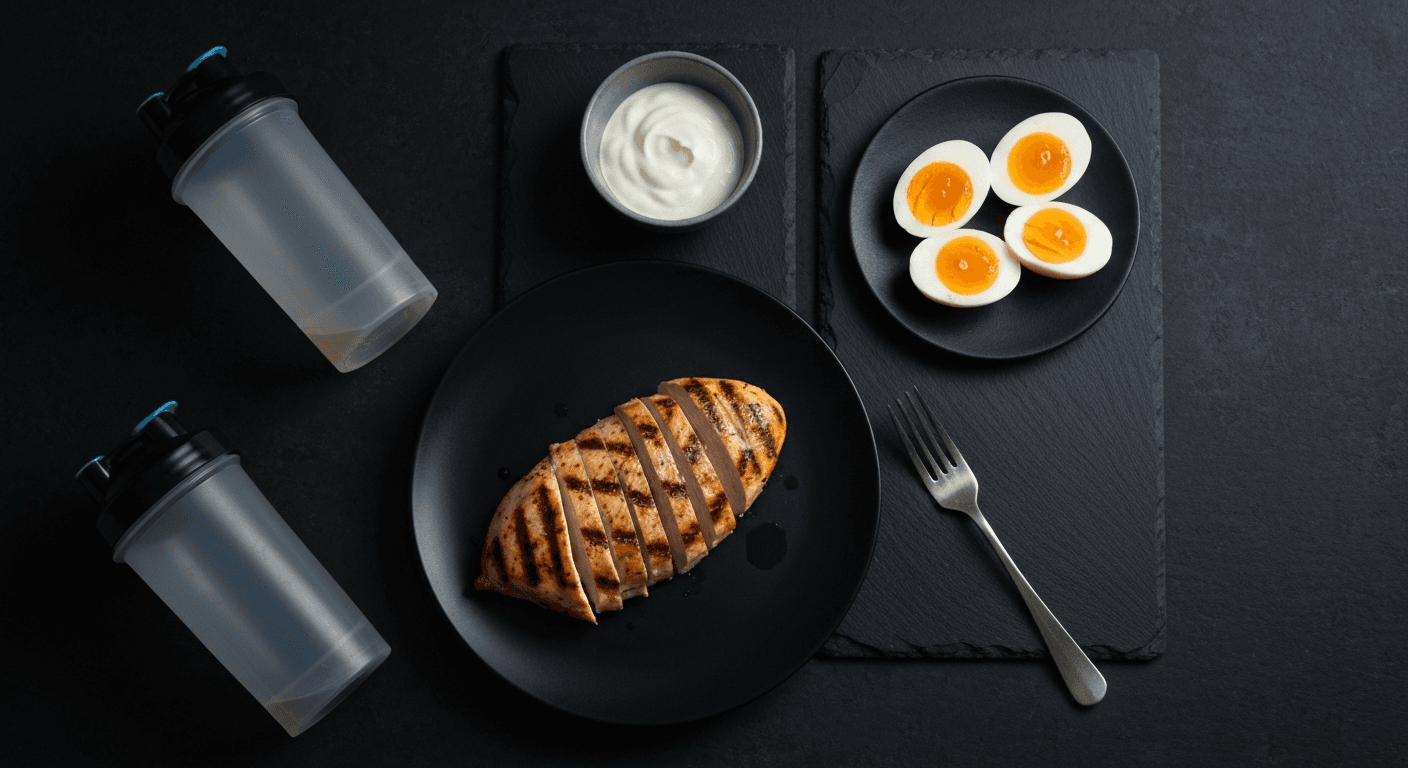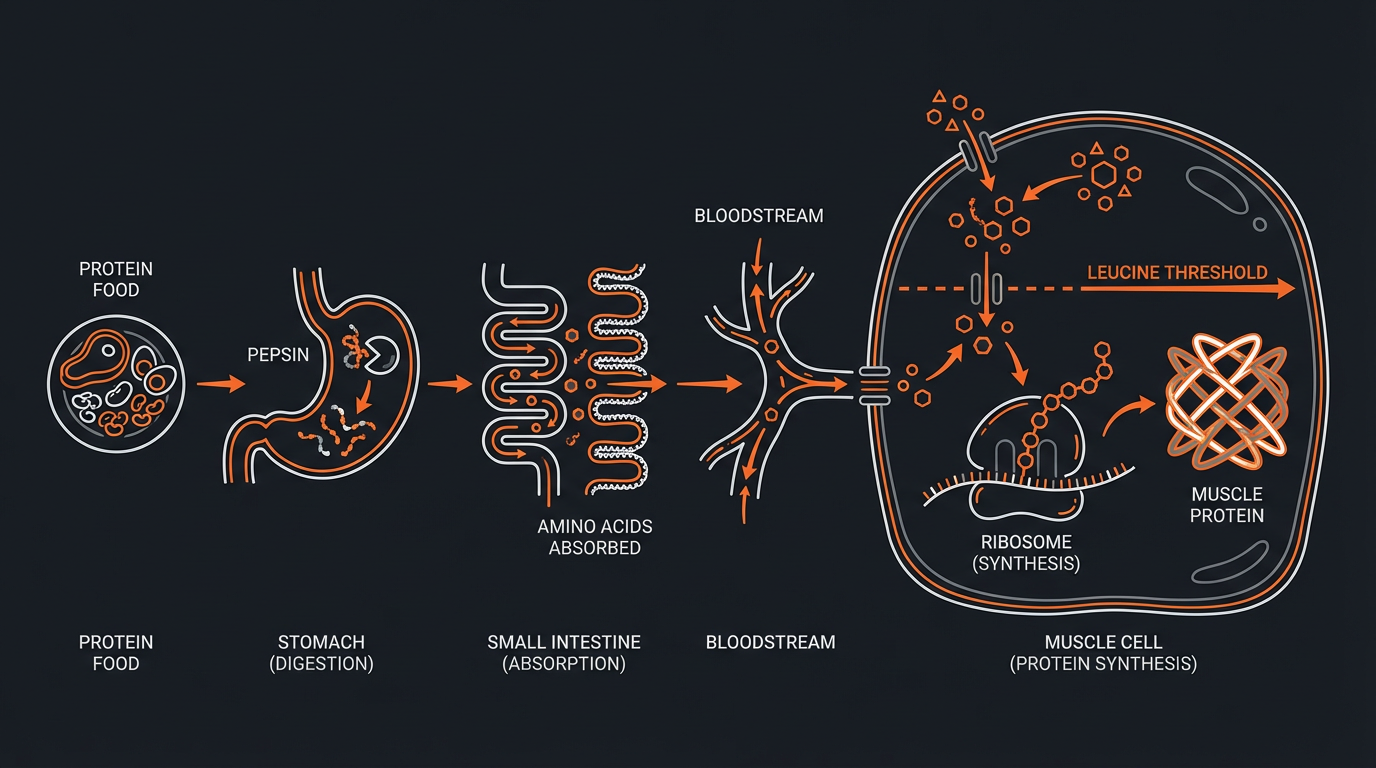How Much Protein Do You Really Need?
Science-based protein recommendations that cut through the supplement industry noise.

Key Takeaways
- You need 1.6 to 2.2 grams of protein per kilogram of bodyweight daily if you're training hard.
- Go higher on the range when you're cutting calories to preserve muscle mass.
- Hitting your total daily protein matters way more than cramming it all right after your workout.
- You don't need protein powder if you can get enough from real food like chicken, eggs, and Greek yogurt.
- Track your protein intake for a week or two to see if you're actually hitting your target numbers.
Get a Free AI Coach on WhatsApp
Ask questions, get workout plans, and track your progress — all from WhatsApp.
Message Your CoachThe Short Answer
If you're training hard and want to build or maintain muscle: 1.6 to 2.2 grams of protein per kilogram of bodyweight per day.
For an 80kg person, that's 128-176g of protein daily. That's it. You don't need more.

What the Research Says
A landmark meta-analysis by Morton et al. (2018) analyzed 49 studies and found that protein intakes above 1.6g/kg/day didn't produce additional muscle growth in most people.
However, during a cut (caloric deficit), higher intakes up to 2.2-2.4g/kg help preserve muscle mass. So if you're dieting, err on the higher side.
Does Timing Matter?
Somewhat, but not as much as supplement companies want you to believe.
What matters most is hitting your total daily protein target. Beyond that, spreading protein across 3-5 meals (25-40g per meal) is slightly better than cramming it all into one or two meals.
The "anabolic window" after training is more like an "anabolic barn door" -- you have several hours, not 30 minutes, to eat after training.
Best Protein Sources
Animal Sources (Complete Proteins)
- •Chicken breast: 31g per 100g
- •Eggs: 6g per egg
- •Greek yogurt: 10g per 100g
- •Salmon: 25g per 100g
- •Lean beef: 26g per 100g
Plant Sources
- •Tofu: 8g per 100g
- •Lentils: 9g per 100g (cooked)
- •Chickpeas: 9g per 100g (cooked)
- •Tempeh: 19g per 100g
Plant proteins work fine for building muscle. You just need to eat a variety to cover all essential amino acids.
Do You Need Protein Supplements?
Only if you can't hit your target through food. Whey protein is convenient and well-researched, but it's not magic. A chicken breast does the same job.
If you're plant-based, a blend of pea and rice protein covers all amino acids and is a solid choice.
Practical Tips
- •Track your protein for 1-2 weeks to see where you actually stand
- •Front-load protein earlier in the day -- most people under-eat at breakfast
- •Prep protein-rich snacks: Greek yogurt, boiled eggs, protein bars
- •Don't stress about hitting the exact number. Consistency across weeks matters more than precision on any single day.
Frequently Asked Questions
- How many grams of protein do I need per day to build muscle?
- Aim for 0.7-1 gram per pound of bodyweight. So if you weigh 180 lbs, shoot for 126-180 grams daily. The research shows diminishing returns above 1g/lb, so don't stress about hitting some crazy number.
- Can you eat too much protein?
- For healthy people, no. Your kidneys handle high-protein diets just fine — that myth has been debunked repeatedly. The real downside of eating excessive protein is that you're wasting money and potentially crowding out other nutrients.
- Do I need protein right after a workout?
- The "anabolic window" is mostly a myth. Your total daily protein intake matters way more than timing. That said, having a protein-rich meal within a couple hours of training is good practice, just not the emergency the supplement companies want you to believe.
- What are the best high-protein foods for building muscle?
- Chicken breast, Greek yogurt, eggs, lean ground beef, cottage cheese, and canned tuna are the staples. They're cheap, widely available, and pack 20-30g of protein per serving with minimal prep.